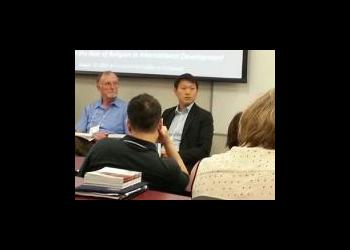Role of religion in international development strong and growing, say participants in forum
The worldly practice of promoting economic progress is sometimes seen to be at odds with the spiritual goals of religion.
But at a conference here last month, academics, practitioners and religious leaders examined the role of religion in international development and concluded that the impact and importance of faith-based communities and organizations in development is significant and growing.
Participants in the day-long forum, held on 27 August 2013 on the topic of “Faith, Belief and Development,” offered a wide range of perspectives.
On the one hand, there were suggestions that religions and religious leaders sometimes hinder development, as when, for example, the advancement of women is blocked in the name of “traditional practices.”
Others pointed out that religious people and communities have always been front-and-center in development work, whether in charitable efforts like building schools or health clinics or simply in inspiring many development practitioners to help others.
One thing, however, was agreed upon: that the role of religion must be factored into any development program or process.
“Religion must be mainstreamed within development,” said Tamsin Bradley, a senior lecturer in international development studies at the University of Portsmouth, who gave the keynote speech.
“Religion is important to local people in many developing countries because it forms a lens through which they see and relate to the world and provides a sense of identity and belonging. Religion also provides a moral code to live by and therefore impacts on decision-making processes and human actions,” said Dr. Bradley.
From these factors and others, she said, the public and private expression of religion “can be a useful source of motivation in the achievement of development goals.”
Jennifer Henry, executive director of Kairos Canada, a coalition of Canadian churches working for peace and justice, agreed, saying however that there are a number of ways in which faith-based organizations and development organizations function differently – even though they work for similar goals.
Religions tend to take a long term view, she said, whereas development practitioners often operate on more limited time frames.
She also said that “religious people see development as a vocation, whereas development people look for professional competence.”
And, she added, “religious communities know that not everything important is of this world – whereas development people are preoccupied with this world.”
The material-spiritual dichotomy in development work was also discussed by Ming Hwee Chong, a representative of the Baha’i International Community to the United Nations, who was invited to speak as a practitioner discussant at the event.
He suggested that international development efforts were hindered by prevalent conceptions of human nature that were reductive in nature, an example being the “economic man” that “pursues his self-interests in a rational, calculated, and self-maximizing manner within an arena of competition over scarce resources.”
Mr. Chong suggested that an alternate conception of human nature offers a more fruitful viewpoint – and better reflects our lived reality.
“This model recognizes in human beings two contrasting but ultimately related dimensions: an animal nature inherited from millions of years of physical evolution, and a spiritual nature that makes it possible for us to understand and satisfy material needs within appropriate limits, while rising above the exigencies of mere animal existence.”
A proper understanding of the dynamic interplay between these natures, and the role of religion in promoting the spiritual side of our reality, can help development practitioners focus on the expansion of those human capacities and capabilities that will promote the greatest level of individual and community empowerment in the long run, he said.
“We will have individuals who not only pursue their own economic welfare, but refute those prejudices that help perpetuate extreme inequalities of income and resources,” he said. “We will also have leaders who will not only work for the advancement of their constituents, but will also withstand the temptations of corruption and graft.
“And there will be communities that not only produce enough to meet their needs, but will exercise the discipline to voluntarily limit consumption in pursuit of a more ecologically sustainable world,” said Mr. Chong.
The forum was sponsored by the Canadian Association for the Study of International Development and the Canadian Council of International Cooperation (CCIC). It was held at Université du Québec en Outaouais. Read the program for the forum.
